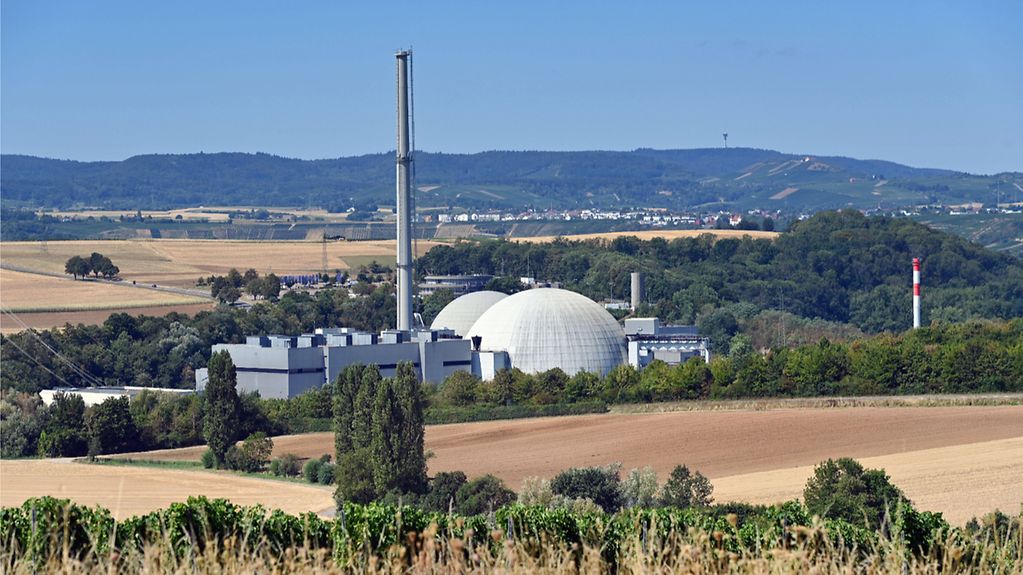Nuclear power stations kept in service on a temporary basis
In a draft law to amend the Nuclear Law, the Federal Government has set out the conditions for the three nuclear power stations that are still in service to continue operating until no later than 15 April 2023. The aim is to put provisions in place to ensure there are no electricity shortages this winter.
3 min reading time

The Neckarwestheim nuclear power station near Heilbronn. By keeping the three nuclear power stations still in operation running until 15 April at the latest, the Federal Government is making it possible to get through the winter safely.
Photo: IMAGO/Sven Simon
The supply situation across the whole of Europe is stretched due to Russia’s war of aggression against Ukraine, but is also affected by droughts, low water levels and problems with French nuclear power stations. This is why further measures are needed to help guarantee electricity supplies this winter.
Package of measures needed
In September the Federal Ministry for Economic Affairs commissioned a second “stress test” of supply security. This found that a whole package of measures was needed to avoid electricity shortages. This includes the recent decision to continue the operation of three nuclear power stations at Emsland, Isar 2 and Neckarwestheim 2 until 15 April 2023 at the latest.
Safety guaranteed at three nuclear power stations
Given that the extension of operations is for a short period only, the requirement for periodic safety inspections (in addition to ongoing monitoring) is being waived. The safety of the facilities will of course be kept at a high level during the extended operation thanks to comprehensive official monitoring backed by applicable law.
Nuclear power in service until mid-April 2023
Nuclear power is a high-risk technology and there is a residual risk from operating nuclear power stations. If the three facilities were to be kept in service for longer, new fuel would also be required. This would result in several hundred tonnes of new, highly radioactive waste, but at present no-one knows where it should be stored. As such, the intention remains for nuclear power to be essentially phased out on 31 December this year, as the law currently requires. By keeping the three nuclear power stations still in operation running until 15 April at the latest, the Federal Government is making it possible to get through the winter safely, and is responding to a crisis situation.
Federal Chancellor uses directives authority
The amendment to the Nuclear Law implements the mandate from the Federal Chancellor’s directive decision. This decision also includes presentation of an ambitious law to increase energy efficiency and the implementation of the agreement between the Federal Government, the government of North Rhine-Westphalia and RWE to delay the coal phase-out in the Rhenish mining area. All involved are working flat out to implement these two measures.
Key decisions already taken
The energy and wider conditions next winter will be different, and we will have different and improved conditions for energy supplies. For example, the Federal Government is reducing gas purchases from Russia and diversifying our gas sources. Increased gas supplies from Norway and the Netherlands, along with additional imports through LNG terminals across North-West Europe and a reduced demand for gas are largely compensating for reduced gas imports from Russia. The Federal Government is in discussions with various federal states with a view to further diversifying gas imports and to secure new gas and prospective hydrogen partnerships. The liquefied natural gas (LNG) terminals are being expanded and our gas stores are filling up.
Currently, gas storage in Germany is at over 95 percent capacity. In order to reduce gas consumption, Germany is temporarily employing more coal-fired power stations to generate electricity. And last but not least, renewables are being expanded more quickly. The share of renewable energy sources in gross electricity consumption is to increase to at least 80 percent by 2030. “With every step we take, we’re changing our situation and improving it dramatically,” said the Federal Chancellor at a press conference on the Alliance for Transformation.